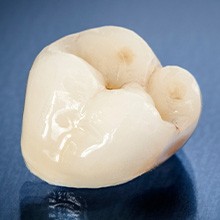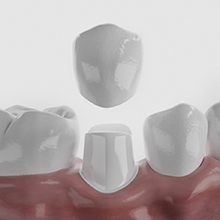

At Smile By Design of Virginia Beach, Dr. Santos and Dr. Folck always recommend the most conservative treatment possible to repair damaged teeth. If you have a small cavity or fracture, we can usually use a simple dental filling to restore your tooth. But there are situations when the damage is more severe and there isn’t enough original tooth structure left to support a filling. This is when we recommend dental crowns in Virginia Beach.

Sometimes called a “cap,” a dental crown is a type of dental restoration that completely covers the crown of a tooth. It’s matched in size, shape, and color to the rest of your teeth so that it looks very natural, and is cemented into place to fit snugly over your existing tooth.
Crowns can be made of various materials, including ceramic, porcelain, gold, or other metals. We’ll discuss your cosmetic goals, the location of the tooth, and other factors before recommending a material.

We’ll schedule two appointments for your dental crown procedure. Here’s what you can expect:

As a dentist in Virginia Beach with your long-term oral health in mind, we always recommend saving your natural teeth whenever possible. One of the biggest benefits of a dental crown is that it saves a damaged tooth that might otherwise need to be extracted.
Crowns are very strong, so you can continue using a tooth that’s been damaged or weakened for many years to come. In addition to providing strength and function, a crown will also look great and restore the appearance of your smile as well.

With proper care, dental crowns can last 15-20 years. First, we always recommend regular checkups and cleanings so we can keep an eye on all of your dental work and catch any potential problems early. Your crown itself can’t get a cavity, but there’s a strip of exposed enamel where the crown and tooth meet that can. By maintaining good oral hygiene habits, you’ll keep your natural teeth healthier and also extend the life of your dental work.
If you clench and grind at night, we recommend a nightguard to protect your crown from chips and fractures. In addition, it’s a good idea to avoid chewing or biting on anything hard, such as ice, pens, or hard candy.
Dental crowns are a wonderful investment in your oral health. If you have any questions or think you may have damaged teeth that could benefit from dental crowns, give us a call today!

If you’ve been informed that you’re going to need a dental crown to restore one of your teeth, you might have doubts—not about the restoration itself, but rather, the potential cost of care. However, there’s no reason to fret; our team will make sure that you understand the cost factors that determine the price of your crown, as well as how to make the treatment easier on your wallet. Once a thorough price estimate has been created, you’ll be able to review it before moving forward with care. In the meantime, here’s a brief overview of what you can expect in terms of cost.

When it comes to figuring out how much you’ll pay for your dental crown in Virginia Beach, our team will need to review a few factors. However, we’ll be sure to keep you in the loop so you know exactly what the cost breakdown of your new dental crown is. The factors we’ll be reviewing include:

The good news is that, yes, in many cases, dental insurance plans are likely to offer coverage for dental crowns—it’s possible for this amount to be up to 50% of the total in some cases, as dental crowns are often deemed medically necessary and beneficial for a patient’s oral health. However, in any case, it’s wise to familiarize yourself with the details of your plan before committing to treatment. Our team is happy to review the fine print of your plan with you to ensure that you’re making the most of your benefits and saving wherever possible.

If you don’t have dental insurance, don’t worry—the cost of your dental crown can still be made more affordable. Our practice is proud to offer financing through Cherry and CareCredit, two third-party financers who offer low-to-no interest payment plans with flexible windows to qualifying patients. Signing up is easy, and our knowledgeable team is happy to help you with the process or answer any initial questions you have.

Our team uses crowns to help patients enjoy healthier, more attractive smiles. If you believe you need one, you are more than welcome to visit us for a restorative consultation. In the meantime, you might want to know more about this treatment. Below, you will find answers to some frequently asked questions about dental crowns in Virginia Beach. If you would like further information about anything you discover here, feel free to give us a call.
Dental crowns can be made out of various materials. In the past, they were primarily constructed out of metals, such as nickel, chromium, silver, and even gold. While metal crowns are quite durable, and they remain a suitable option in many cases, our practice has upgraded to more aesthetically pleasing materials. We typically use porcelain or ceramic, materials that closely imitate the look and feel of natural tooth enamel. Plus, because they are metal-free, they are an excellent choice for patients with allergies or those who are concerned about metal absorption.
Dental crowns are a long-term solution to issues like broken teeth, worn-down teeth, and more. They are often referred to as a permanent treatment. However, they do not actually last forever. Depending on how you care for your restoration, it may last for 5 – 15 years or longer. You can help it stand the test of time by keeping up with oral hygiene, visiting your dentist in Virginia Beach for routine cleanings and checkups, and avoiding activities that might break your crown (such as biting on hard objects).
Also, bear in mind that while crowns are not technically permanent, they are irreversible. The tooth modification that takes place during the treatment process necessitates that the tooth will always need a restoration to protect it.
Some warning signs that a crown may need to be replaced include:
If you believe your crown is nearing the end of its lifespan, visit us. We will examine your mouth and recommend your next steps.
The most invasive part of the crown process is when the tooth is being modified to fit beneath the restoration. We always numb patients’ mouths during this stage of treatment, so you can expect to feel little to nothing. We also offer sedation for patients who are particularly nervous or sensitive. After the procedure, you may experience some soreness and sensitivity, but that typically wears off within a few days.
When your temporary crown is removed and your permanent one is placed, you may feel some pressure in your mouth. However, the process is usually quick, and we often do not even need to use local anesthesia for it.